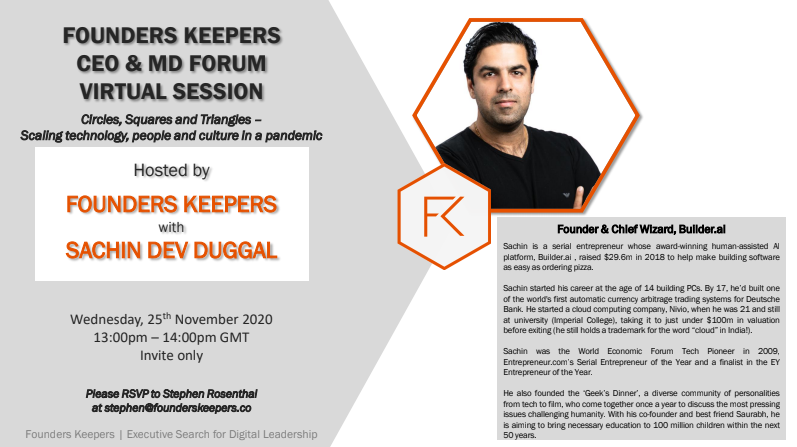Recently, we had an exciting session with the distinguished community of leading entrepreneurs and leaders from private, private equity and venture capital-backed businesses from across the world at the Founders Keepers CEO/MD Forum. Founders Keepers is an executive search firm, building leadership teams for growth stage and venture backed companies. They hosted the latest CEO/MD Forum on 25th November, featuring our very own Chief Wizard, Sachin Dev Duggal. The discourse was invigorating and the questions from participants, riveting. During those 60 minutes, Sachin shared his thoughts on how to scale a business during a pandemic, through technology, people and culture, citing some of Builder.ai’s key lessons learned, achievements and mistakes.
At the session, Stephen Rosenthal, Director of Founders Keepers noted, “From browsing the site alone, it’s instantly clear why the company has scaled so significantly, attracting close to $30m of funding and building a global client portfolio that ranges from SMBs and entrepreneurs to Fortune-listed multinationals and armies.”

Since it was a restricted event and most of you couldn’t be there, here are the takeaways from our conversation.
Stephen: So what is Builder and how have you made creating software “as easy as ordering pizza”?
Sachin: We’ve arrived at a unique point in history, where every business is now, by default, a software business. We do many things in life and business where we don’t need to be experts – we take flights without being qualified pilots and drive cars without being qualified mechanics. Why should we feel the need to be software engineers?I don’t want my kids to necessarily be coders. I want them to be going out, solving problems, using software as a tool. Our platform is for the entire audience of people who want to order – rather than make - the software they need to improve their processes and better serve their customers.If you want a pizza for dinner, you can buy a pizza oven, do a cookery course, buy the ingredients and perfect your skills. Equally, you can order it off the Domino’s app and put a movie on whilst you wait for the delivery.We are that Domino’s for software. You come on our platform, tell us what you want, and we help you build it. We realised that 80% of apps do the same thing, so have developed 500 common features that customers can simply drag and drop into their app. Because we’ve already built those features for you, rather than spending $5000 on a sign-up feature, you might pay $200. That adds up to a sizeable saving across a whole app of reusable features. Our global network of professional services then tailors your app to your specific needs. People who have never coded a line of code can build a fully functional app, 70% cheaper and six times faster than going to a software shop.
Our clients range from BBC and the Indian Army, to the 11-year-old girl who wanted to build Pinterest for Butterflies and the bakery in Riyadh who wants to deliver cupcakes within a two hour delivery slot.
Stephen: Could you explain the “Circles, Squares and Triangles” theory you’ve developed on scaling?
Sachin: Like all expanding businesses, we’ve made mistakes in the past two years. Principally, we added 160 people to what had been a 100 person company. Growing from 10 to 20 and 50 to 100 had been challenging to a point, but we were left scratching our heads by the level of disruption caused by scaling from 100 to 260.When we saw that our clients, investment companies and friends had all face the same challenges, We came up with a blueprint, breaking Builder down into circles, squares and triangles. The circle is every single person you touch – customers, vendors, followers. It grows exponentially as your company and product expand.The square is the number of people you employ. We learned that the square should never grow at more than 1.9x the existing size of the company. It seems obvious to us now, but runs counter to the widely-held “grow at any cost” entrepreneurial mantra.Depending on your company’s set up, the square could be multiple squares, representing offices, geographies or satellites. Irrespective, you should avoid growth of more than 2x. If you don’t, you risk inverse culture flow, a disaster for any company.What we realised much later was the triangles. Triangles exist within the square and are the connecting dots – the people in the organisation who both understand your culture and how to constantly connect people and ideas. The metaphorical telephone operators of the 1950s.An efficient triangle means your culture of the square remains intact. The problem comes when the square expands at 2x. At best, the triangle will only expand at 1/2x, creating a thinner and thinner triangle and a problem for the business, as more and more of the square finds itself outside of the triangle on either side. The vacuum created by these spaces is filled with disconnected, damaging micro-cultures.As we’ve learned, the key to successfully growing your company is the widening of the triangle.So, the circle is about technology, building what you need to provide the support to grow. The square and triangle are there to help you protect the health of your company.
Stephen: How does this theory fit into building for growth during the COVID-19 pandemic?
Sachin: It was hard enough to scale a business pre-COVID. Now, the square and triangle relationship is even more important.When everyone is remote (we have 250 staff around the world) you cannot communicate in the same way. As companies move through the pandemic, they have to work to keep as many people as possible inside the triangle.
Stephen: What is the risk if they don’t?
Sachin: There is cause and effect. Culture is ultimately the single most important element in keeping the triangle wide. As the triangle gets narrower, the number of people inside it reduces and more and more micro-cultures emerge.When culture goes off, you have knock on effects. You can’t tell a great hire from a bad one, as the interviewers don’t know what great looks like in your organisation. You don’t build enough emotional glue for new starters, meaning they make decisions rationally, rather than emotionally. Businesses are all about teams, teams are all about people and people are all about emotion. When people start working from first principles of what they themselves want, as opposed to the company, you end up not with a team, just lots of people.Ultimately, the job of a leader is to direct the workforce towards a north star. It’s very hard to do that if the team don’t believe you or understand why you’ve selected that destination. You don’t have the time to always explain it from the beginning. Further downstream, this manifests itself in poor hiring, missed targets and strategic misalignment that can impact everything the company does.
Stephen: So, what's the solution?
Sachin: Communication. Whether internal or external, as things move faster and faster, communication needs to be asynchronous in its nature. That’s where technology comes in. So, what begins as a problem of culture ends up a problem of technology. You cannot solve these issues by just speaking with everyone when you have a team of 250. The tech needs to scale to keep everyone aligned.
Stephen: The triangle seems absolutely key to this model. How do you grow it successfully?
Sachin: There isn’t a cap to the size of the triangle, just the speed at which it grows. As Simon Sinek would say, you need an equal mix of “whys”, “hows” and “whats” to grow successfully.Businesses can’t rely on individuals. Teams have to work together. At Builder, we have product teams that work across the spectrum of our projects. We need to get them to think about problems in the same way. We spend huge amounts of time focusing on “why”. I don’t subscribe to a world where companies are meritocracies. At best (and judge me if you will!) they are benevolent dictatorships. The idea is that you delegate to people to be your marshals and lieutenants, with you as the leader spending a huge amount of time explaining why it’s important.Leaders of scaling businesses (250-300 people) spend a less time on the “hows”, and really shouldn’t be focusing on the “whats” at all, unless within their specific area of expertise. As you scale to 500 people, you probably just focus on key “hows”. That’s also how you strengthen the triangle.
Lakshmi is a communications professional with over 6 years of experience across industries- from digital media and fashion to health and technology. She specialised in Integrated Marketing and Communications cum laude, and naturally, can work her magic best when handling public relations, marketing and editorial content and communication. Most people find her moderately introverted, conspicuously sassy, significantly energetic, and massively dog-loving.












 Facebook
Facebook X
X LinkedIn
LinkedIn YouTube
YouTube Instagram
Instagram RSS
RSS


